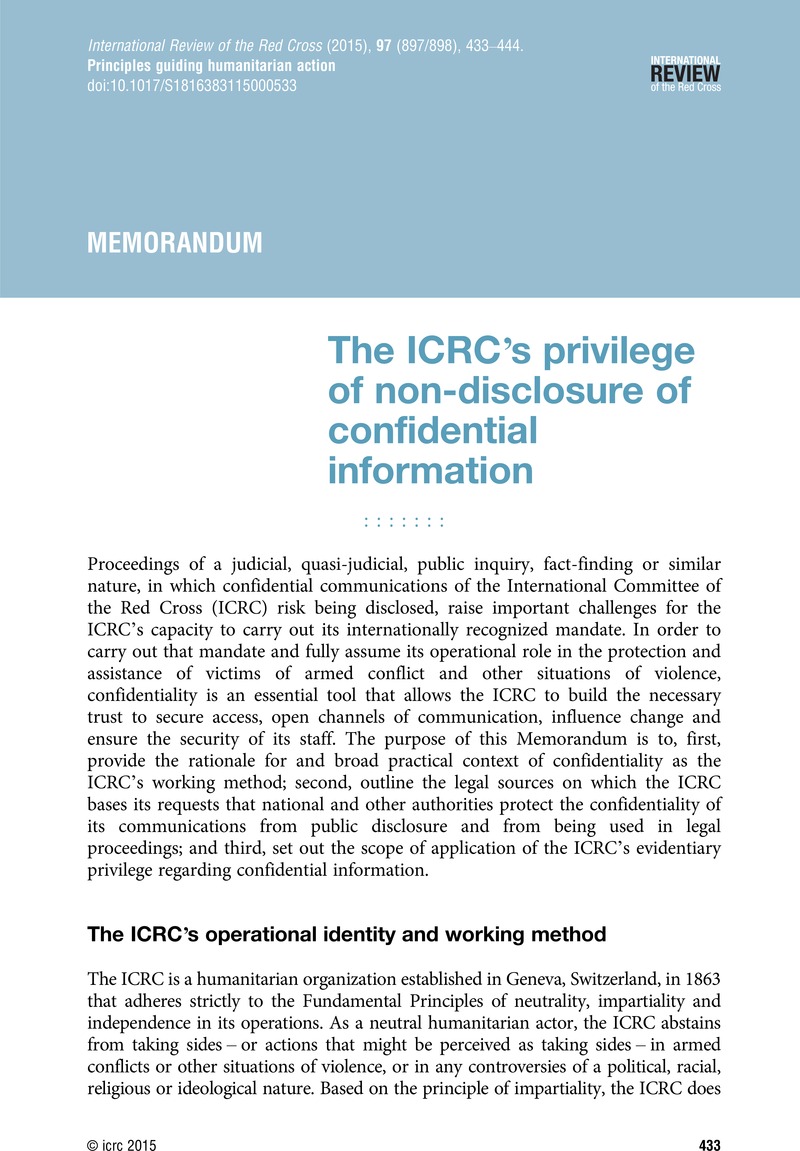Article contents
The ICRC's privilege of non-disclosure of confidential information
Published online by Cambridge University Press: 08 October 2015
Abstract

- Type
- Reports and Documents
- Information
- International Review of the Red Cross , Volume 97 , Issue 897-898: Principles guiding humanitarian action , June 2015 , pp. 433 - 444
- Copyright
- Copyright © icrc 2015
References
1 At the time of writing, Additional Protocol I had been ratified by 174 States and Additional Protocol II by 168 States (for up-to-date numbers, see www.icrc.org/ihl, accessed in April 2015). The Statutes of the International Red Cross and Red Crescent Movement were adopted by consensus by the International Conference of the Movement, in which all States party to the Geneva Conventions participate.
2 To address humanitarian concerns, the ICRC also invokes other fundamental rules of international law besides IHL, as applicable, in situations of armed conflict. In other situations of violence, where IHL is, by definition, not applicable, the ICRC engages with authorities exclusively on the basis of the before-mentioned fundamental rules of international law.
3 ICTY, Prosecutor v. Simić, Case No. IT-95-9, Decision on the Prosecution Motion Under Rule 73 for a Ruling Concerning the Testimony of a Witness, 27 July 1999, paras 72–74 (emphasis added).
4 ICTY, Prosecutor v. Brdjanin, Appeals Chamber, Case No. IT-99-36, Decision on Interlocutory Appeal, 11 December 2002, para. 32.
5 ICTR, Prosecutor v. Muvunyi, Case No. ICTR-2000-55, Reasons for the Chamber's Decision on the Accused's Motion to Exclude Witness TQ, 15 July 2005, paras 14–16.
6 Statute of the Special Court for Sierra Leone, 16 January 2002 (entered into force 12 April 2002), Rule 20, para. 3.
7 ICC, Rules of Procedure and Evidence, reproduced from the Official Records of the Assembly of States Parties to the Rome Statute of the International Criminal Court, First Session, ICC-ASP/1/3 and Corr. 1, New York, 3–10 September 2002, Part II.A, Rule 73.
8 STL, Rules of Procedure and Evidence, STL-BD-2009-01-Rev.6-Corr.1, 20 March 2009, Rule 164.
9 MICT, Rules of Procedure and Evidence, MICT/1, 8 June 2012, Rule 10.
10 Numbers are up to date as of 1 April 2015.
11 See also the finding of the ICTY in the Simić case, above note 3, paras 72–73, reaffirming the ICRC's capacity to carry out its mandate as the rationale for its privilege of non-disclosure under international law. The same rationale underpins the privilege provided for in bilateral status agreements and primary domestic legislation.
12 ICTY, Simić, above note 3, paras 76, 79 (emphasis added).
13 ICC, above note 7, Rule 73.
14 See, for example, ICTR, Muvunyi, above note 5, paras 17–18.
15 Ibid., para. 16.
- 3
- Cited by


